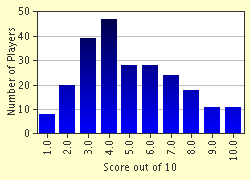Quiz Answer Key and Fun Facts
1. In the 17th century, what English philosopher prepared a list of passages that seemed to negate Mosaic authorship of the Pentateuch?
2. When was the Documentary Hypothesis formed?
3. The Documentary Hypothesis speculates that the Torah had four primary sources. Which of the following is not one of the letters given to one of those sources?
4. Two of the sources are named for the names used for God. What are these names?
5. Scholars assign the term "D" for the Deuteronomist source. In addition to Deuteronomy, what other book(s) do most of these scholars think this "D" author wrote?
6. According to Wellhausen, which was the latest source for the Bible?
7. The Documentary Hypothesis was created in order to account for what?
8. Which of the following arguments, once used in favor of the Documentary Hypothesis, has now been disproved?
9. Which is the oldest of the four sources, according to the Documentary Hypothesis?
10. Which of the following is evidence used to disprove the Documentary Hypothesis?
Source: Author
skylarb
This quiz was reviewed by FunTrivia editor
ArleneRimmer before going online.
Any errors found in FunTrivia content are routinely corrected through our feedback system.

